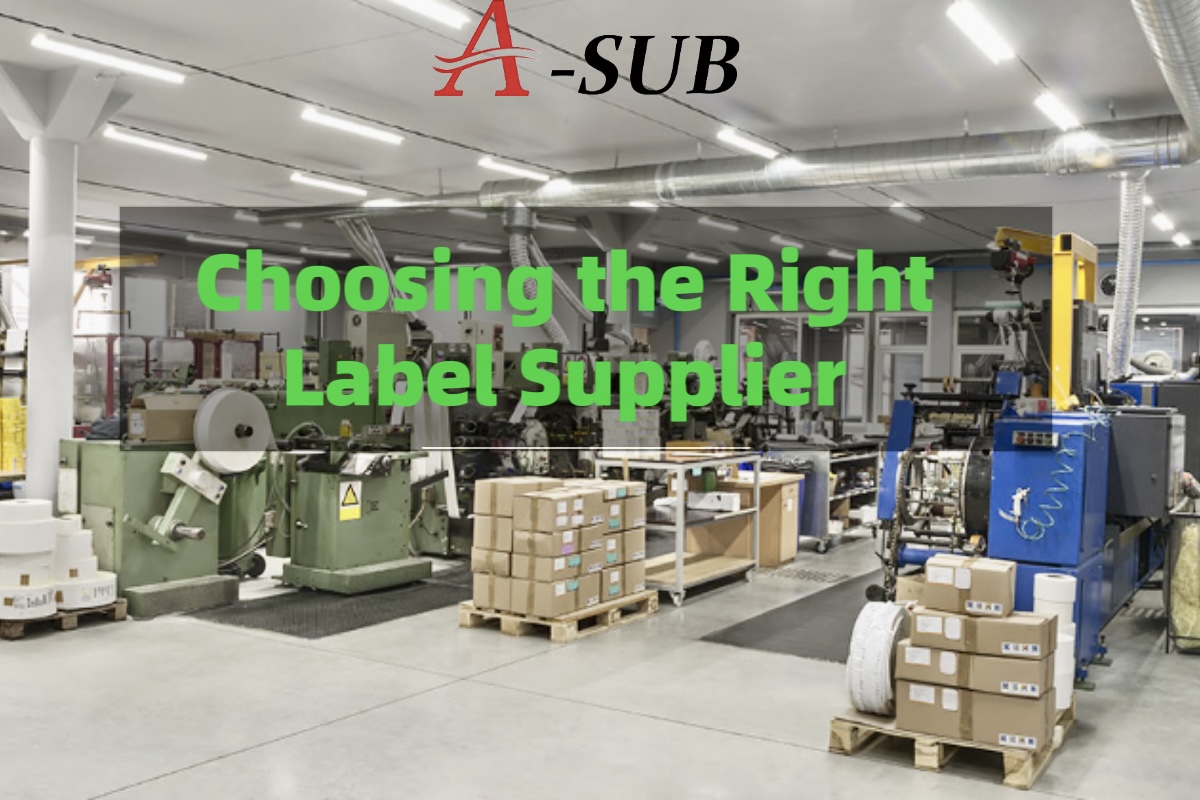Intro

Product packaging plays a crucial role in capturing consumers' attention and influencing their purchasing decisions. Among the various elements of packaging, labels hold significant importance. They not only provide essential product information but also contribute to brand recognition and consumer engagement. Therefore, selecting the right label supplier is paramount for effective product packaging.
Understanding the Impact of Labels on Product Packaging

Labels serve as the face of a product, representing its brand identity and creating a lasting impression on consumers. They play a vital role in establishing brand recognition and differentiating products from competitors. Additionally, labels convey critical information such as ingredients, usage instructions, and regulatory compliance details, enabling consumers to make informed choices.
Furthermore, labels have a significant impact on consumer perception and purchase decisions. A well-designed and high-quality label can enhance the perceived value of a product and instill trust in consumers. Conversely, a poorly executed label can lead to negative perceptions and deter potential buyers. Therefore, choosing the right label supplier becomes crucial to ensure favorable consumer response and overall product success.
Challenges in Label Supplier Selection for Product Packaging

Selecting the most suitable label supplier for product packaging comes with its fair share of challenges. Addressing these challenges is crucial to ensure that the chosen supplier meets the required standards and aligns with the business's packaging goals. The key challenges in label supplier selection include label quality and supply chain management.
●Label Quality
Label quality is of utmost importance as it directly impacts the overall appeal and durability of the packaging. Labels should withstand various environmental factors, such as temperature changes, moisture, and transportation, without compromising their appearance or functionality. The challenge lies in finding a label supplier that consistently delivers high-quality labels that meet or exceed industry standards. Thoroughly assessing the supplier's track record, certifications, and quality control processes can help mitigate this challenge.
●Supply Chain Management
Efficient supply chain management is crucial for seamless packaging operations. Timely delivery of labels is essential to meet production schedules and avoid bottlenecks in the packaging process. It is important to ensure that the label supplier has a robust and reliable supply chain in place. This includes assessing their production capacity, lead times, inventory management systems, and responsiveness to fluctuations in demand. A label supplier that can consistently deliver labels on time and maintain transparent communication throughout the supply chain can help mitigate supply chain-related challenges.
By carefully evaluating potential label suppliers based on label quality, and supply chain management, businesses can address these challenges and select a supplier that meets their specific packaging needs. This ensures that the labels used in product packaging are of high quality, visually appealing, and delivered on time, ultimately contributing to the overall success of the packaging and the product itself.
Factors to Consider When Selecting a Label Supplier

When selecting a label supplier for product packaging, several crucial factors should be taken into account. These factors play a significant role in determining the success of the packaging and the overall product. The key factors to consider are label quality, customization options, production capacity, and supply chain management.
Label quality is paramount as it directly impacts the visual appeal, legibility, and durability of the packaging. High-quality labels enhance the overall perception of the product and instill confidence in consumers. When evaluating label suppliers, it is essential to assess their reputation, certifications, and quality control processes. Requesting samples of their labels and inspecting them closely for factors such as print clarity, color accuracy, adhesive strength, and resistance to environmental conditions will help gauge the supplier's commitment to label quality.
●Customization Options
Each product has unique packaging requirements, and the label supplier should offer customization options to meet these specific needs. Customization allows for better brand representation, product differentiation, and alignment with the overall packaging concept. Consider whether the label supplier can accommodate various label sizes, shapes, finishes, and printing techniques. The supplier's ability to provide design support and adapt to specific branding requirements is crucial for creating labels that effectively communicate the brand's identity and resonate with the target market.
●Production Capacity
The label supplier's production capacity is an important consideration to ensure that they can meet the business's packaging demands. Adequate production capacity ensures timely delivery and the ability to handle both small and large-scale orders. Assess the supplier's equipment, technology, and production processes to determine their efficiency and scalability. It is essential to ensure that the supplier can handle the expected volume of label production without compromising quality or causing delays in the packaging timeline.
●Supply Chain Management
Smooth supply chain management is vital to avoid disruptions in the packaging process. The label supplier should have a well-established supply chain that ensures consistent and reliable delivery of labels. Evaluate the supplier's logistics capabilities, lead times, inventory management systems, and responsiveness to fluctuations in demand. A supplier with a robust supply chain can provide timely delivery, reduce the risk of delays or shortages, and maintain transparent communication throughout the process.
Considering these factors when selecting a label supplier will help ensure that the chosen supplier can meet the business's packaging needs effectively. By prioritizing label quality, customization options, production capacity, and supply chain management, businesses can establish a strong partnership with a label supplier that contributes to the overall success of their product packaging.
Ensuring Alignment between Label Supplier and Packaging Needs

To ensure successful product packaging, it is essential to align the capabilities of the label supplier with the specific requirements of the packaging project. This alignment can be achieved through clear communication, evaluation of the label supplier's capabilities, and fostering collaboration.
●Clear Communication
Effective communication is the foundation for a successful partnership between a business and its label supplier. It is important to clearly convey the packaging needs, design aesthetics, functional requirements, and regulatory compliance to the label supplier. Sharing detailed information about the target market, brand positioning, and customer preferences will help the supplier understand the packaging goals and align their services accordingly.
●Evaluation of Label Supplier's Capabilities
Evaluating the label supplier's capabilities is crucial to ensure they can meet the packaging requirements. This evaluation involves assessing their portfolio, expertise, and production processes. Requesting samples of their previous work will provide insights into the quality of their labels, printing techniques, and adherence to design specifications. Conducting site visits or virtual tours can also help assess their technology usage, quality control measures, and overall production capabilities.
●Collaboration
Collaboration between the business and the label supplier is essential to create packaging that aligns with the brand image and product attributes. Regular communication, feedback, and idea exchange throughout the packaging process foster a collaborative environment. The label supplier should be responsive to queries, concerns, and change requests, ensuring that any modifications or adjustments can be made without delay.
By fostering clear communication, evaluating the label supplier's capabilities, and promoting collaboration, businesses can ensure that the chosen supplier understands and meets the specific packaging needs. This alignment leads to the development of packaging that effectively represents the brand and appeals to the target market, resulting in a successful product launch.
As a label supplier with a rich range of products, A-SUB meets all the requirements mentioned above and is fully deserving of your trust. If you are interested, you can click on the A-SUB website to learn more.
Conclusion
In conclusion,choosing the right label supplier is an essential aspect of successful product packaging. Labels significantly impact brand recognition, consumer perception, and purchase decisions. By considering factors such as label quality, customization options, production capacity, and supply chain management, businesses can ensure that their product packaging effectively stands out in the market.
Furthermore, aligning the capabilities of the label supplier with specific packaging requirements and fostering effective communication and collaboration are key to achieving packaging success.






